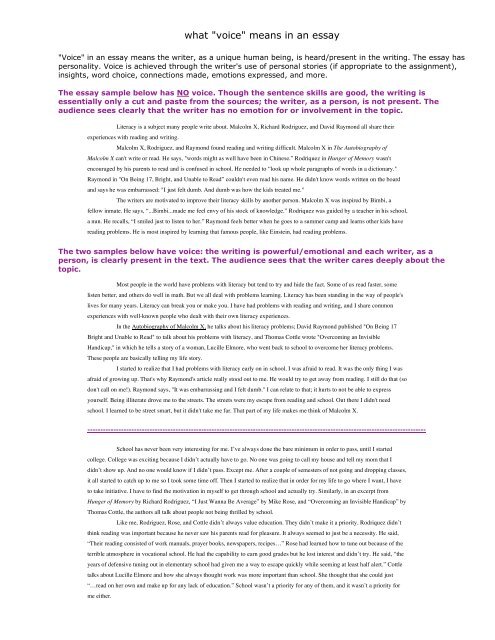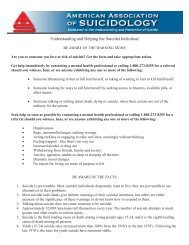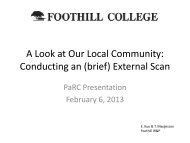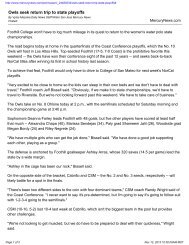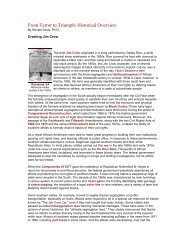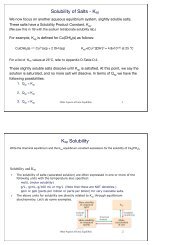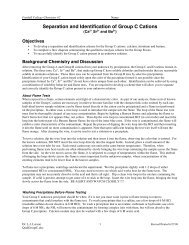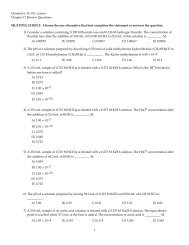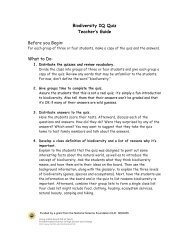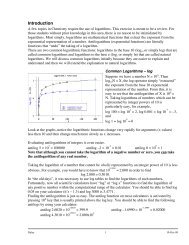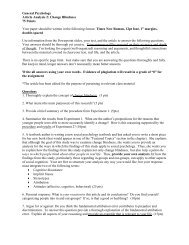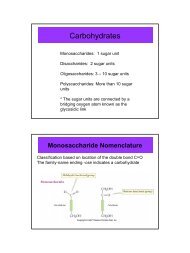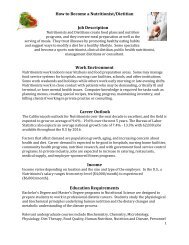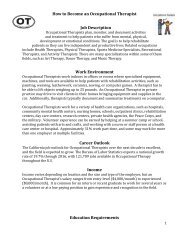what "voice" means in an essay - Foothill College
what "voice" means in an essay - Foothill College
what "voice" means in an essay - Foothill College
You also want an ePaper? Increase the reach of your titles
YUMPU automatically turns print PDFs into web optimized ePapers that Google loves.
<strong>what</strong> "voice" <strong>me<strong>an</strong>s</strong> <strong>in</strong> <strong>an</strong> <strong>essay</strong><br />
"Voice" <strong>in</strong> <strong>an</strong> <strong>essay</strong> <strong>me<strong>an</strong>s</strong> the writer, as a unique hum<strong>an</strong> be<strong>in</strong>g, is heard/present <strong>in</strong> the writ<strong>in</strong>g. The <strong>essay</strong> has<br />
personality. Voice is achieved through the writer's use of personal stories (if appropriate to the assignment),<br />
<strong>in</strong>sights, word choice, connections made, emotions expressed, <strong>an</strong>d more.<br />
The <strong>essay</strong> sample below has NO voice. Though the sentence skills are good, the writ<strong>in</strong>g is<br />
essentially only a cut <strong>an</strong>d paste from the sources; the writer, as a person, is not present. The<br />
audience sees clearly that the writer has no emotion for or <strong>in</strong>volvement <strong>in</strong> the topic.<br />
Literacy is a subject m<strong>an</strong>y people write about. Malcolm X, Richard Rodriguez, <strong>an</strong>d David Raymond all share their<br />
experiences with read<strong>in</strong>g <strong>an</strong>d writ<strong>in</strong>g.<br />
Malcolm X, Rodriguez, <strong>an</strong>d Raymond found read<strong>in</strong>g <strong>an</strong>d writ<strong>in</strong>g difficult. Malcolm X <strong>in</strong> The Autobiography of<br />
Malcolm X c<strong>an</strong>'t write or read. He says, "words might as well have been <strong>in</strong> Ch<strong>in</strong>ese.” Rodriquez <strong>in</strong> Hunger of Memory wasn't<br />
encouraged by his parents to read <strong>an</strong>d is confused <strong>in</strong> school. He needed to “look up whole paragraphs of words <strong>in</strong> a dictionary."<br />
Raymond <strong>in</strong> "On Be<strong>in</strong>g 17, Bright, <strong>an</strong>d Unable to Read” couldn't even read his name. He didn't know words written on the board<br />
<strong>an</strong>d says he was embarrassed: "I just felt dumb. And dumb was how the kids treated me."<br />
The writers are motivated to improve their literacy skills by <strong>an</strong>other person. Malcolm X was <strong>in</strong>spired by Bimbi, a<br />
fellow <strong>in</strong>mate. He says, “...Bimbi...made me feel envy of his stock of knowledge.” Rodriquez was guided by a teacher <strong>in</strong> his school,<br />
a nun. He recalls, “I smiled just to listen to her.” Raymond feels better when he goes to a summer camp <strong>an</strong>d learns other kids have<br />
read<strong>in</strong>g problems. He is most <strong>in</strong>spired by learn<strong>in</strong>g that famous people, like E<strong>in</strong>ste<strong>in</strong>, had read<strong>in</strong>g problems.<br />
The two samples below have voice: the writ<strong>in</strong>g is powerful/emotional <strong>an</strong>d each writer, as a<br />
person, is clearly present <strong>in</strong> the text. The audience sees that the writer cares deeply about the<br />
topic.<br />
Most people <strong>in</strong> the world have problems with literacy but tend to try <strong>an</strong>d hide the fact. Some of us read faster, some<br />
listen better, <strong>an</strong>d others do well <strong>in</strong> math. But we all deal with problems learn<strong>in</strong>g. Literacy has been st<strong>an</strong>d<strong>in</strong>g <strong>in</strong> the way of people's<br />
lives for m<strong>an</strong>y years. Literacy c<strong>an</strong> break you or make you. I have had problems with read<strong>in</strong>g <strong>an</strong>d writ<strong>in</strong>g, <strong>an</strong>d I share common<br />
experiences with well-known people who dealt with their own literacy experiences.<br />
In the Autobiography of Malcolm X, he talks about his literacy problems; David Raymond published "On Be<strong>in</strong>g 17<br />
Bright <strong>an</strong>d Unable to Read" to talk about his problems with literacy, <strong>an</strong>d Thomas Cottle wrote "Overcom<strong>in</strong>g <strong>an</strong> Invisible<br />
H<strong>an</strong>dicap," <strong>in</strong> which he tells a story of a wom<strong>an</strong>, Lucille Elmore, who went back to school to overcome her literacy problems.<br />
These people are basically tell<strong>in</strong>g my life story.<br />
I started to realize that I had problems with literacy early on <strong>in</strong> school. I was afraid to read. It was the only th<strong>in</strong>g I was<br />
afraid of grow<strong>in</strong>g up. That's why Raymond's article really stood out to me. He would try to get away from read<strong>in</strong>g. I still do that (so<br />
don't call on me!). Raymond says, "It was embarrass<strong>in</strong>g <strong>an</strong>d I felt dumb." I c<strong>an</strong> relate to that; it hurts to not be able to express<br />
yourself. Be<strong>in</strong>g illiterate drove me to the streets. The streets were my escape from read<strong>in</strong>g <strong>an</strong>d school. Out there I didn't need<br />
school. I learned to be street smart, but it didn't take me far. That part of my life makes me th<strong>in</strong>k of Malcolm X.<br />
-----------------------------------------------------------------------------------------------------------------------------------<br />
School has never been very <strong>in</strong>terest<strong>in</strong>g for me. I’ve always done the bare m<strong>in</strong>imum <strong>in</strong> order to pass, until I started<br />
college. <strong>College</strong> was excit<strong>in</strong>g because I didn’t actually have to go. No one was go<strong>in</strong>g to call my house <strong>an</strong>d tell my mom that I<br />
didn’t show up. And no one would know if I didn’t pass. Except me. After a couple of semesters of not go<strong>in</strong>g <strong>an</strong>d dropp<strong>in</strong>g classes,<br />
it all started to catch up to me so I took some time off. Then I started to realize that <strong>in</strong> order for my life to go where I w<strong>an</strong>t, I have<br />
to take <strong>in</strong>itiative. I have to f<strong>in</strong>d the motivation <strong>in</strong> myself to get through school <strong>an</strong>d actually try. Similarly, <strong>in</strong> <strong>an</strong> excerpt from<br />
Hunger of Memory by Richard Rodriguez, “I Just W<strong>an</strong>na Be Average” by Mike Rose, <strong>an</strong>d “Overcom<strong>in</strong>g <strong>an</strong> Invisible H<strong>an</strong>dicap” by<br />
Thomas Cottle, the authors all talk about people not be<strong>in</strong>g thrilled by school.<br />
Like me, Rodriguez, Rose, <strong>an</strong>d Cottle didn’t always value education. They didn’t make it a priority. Rodriquez didn’t<br />
th<strong>in</strong>k read<strong>in</strong>g was import<strong>an</strong>t because he never saw his parents read for pleasure. It always seemed to just be a necessity. He said,<br />
“Their read<strong>in</strong>g consisted of work m<strong>an</strong>uals, prayer books, newspapers, recipes…” Rose had learned how to tune out because of the<br />
terrible atmosphere <strong>in</strong> vocational school. He had the capability to earn good grades but he lost <strong>in</strong>terest <strong>an</strong>d didn’t try. He said, “the<br />
years of defensive tun<strong>in</strong>g out <strong>in</strong> elementary school had given me a way to escape quickly while seem<strong>in</strong>g at least half alert.” Cottle<br />
talks about Lucille Elmore <strong>an</strong>d how she always thought work was more import<strong>an</strong>t th<strong>an</strong> school. She thought that she could just<br />
“…read on her own <strong>an</strong>d make up for <strong>an</strong>y lack of education.” School wasn’t a priority for <strong>an</strong>y of them, <strong>an</strong>d it wasn’t a priority for<br />
me either.
An <strong>essay</strong> c<strong>an</strong> have voice without a writer's personal <strong>in</strong>formation. Writers may not<br />
w<strong>an</strong>t to share personal stories, <strong>an</strong>d, for m<strong>an</strong>y assignments, personal <strong>in</strong>formation is<br />
not appropriate to <strong>in</strong>clude. In either situation, personality <strong>an</strong>d orig<strong>in</strong>ality (voice) c<strong>an</strong><br />
be expressed with <strong>in</strong>sights, reflections, <strong>an</strong>d, as <strong>in</strong> the example below, with unique<br />
connections: voice is heard not by personal <strong>in</strong>formation but by the cont<strong>in</strong>ued use of<br />
the metaphors "w<strong>in</strong>gs" <strong>an</strong>d "fly<strong>in</strong>g."<br />
"I believe I c<strong>an</strong> fly" is a famous song written by R. Kelly, a black s<strong>in</strong>ger. This song is about a m<strong>an</strong><br />
who th<strong>in</strong>ks one day he c<strong>an</strong> be totally free. The “fly” represents freedom. To be able to fly, we need “w<strong>in</strong>gs.” So,<br />
<strong>what</strong> is our "w<strong>in</strong>gs"? I didn't know the <strong>an</strong>swer until I read the story of Malcolm X, Richard Rodriguez, <strong>an</strong>d<br />
Lucille Elmore. I found out our "w<strong>in</strong>gs" is literacy. Literacy makes them free. Literacy gives them the power to<br />
“fly."<br />
What happen if you don’t have “w<strong>in</strong>gs”? In The Autobiography of Malcolm X, Malcolm X went to<br />
school until 8th grade, but he still is unable to read or write. Later, <strong>in</strong> jail, when he w<strong>an</strong>ts to read someth<strong>in</strong>g,<br />
"nearly all of the words…might as well have been <strong>in</strong> Ch<strong>in</strong>ese." A similar problem happened to Lucille Elmore<br />
<strong>in</strong> the article “Overcom<strong>in</strong>g An Invisible H<strong>an</strong>dicap,” by Thomas J. Cottle. Elmore f<strong>in</strong>ished high school, but when<br />
she was gett<strong>in</strong>g older she feels illiterate. She said, “I didn’t know books, I didn’t know history, I didn’t<br />
know…” She couldn't fly. Like Malcolm X <strong>an</strong>d Elmore, Richard Rodriguez has problems with his school <strong>an</strong>d<br />
also at home. In the excerpt from Hunger Of Memory, he was not encouraged to read at home. At school, he<br />
was confused <strong>an</strong>d feels lonely. He recalls, "I needed to look up whole paragraphs of words <strong>in</strong> a dictionary." This<br />
sentence best represent his poor read<strong>in</strong>g <strong>an</strong>d writ<strong>in</strong>g skill dur<strong>in</strong>g that period of time. These four have the same<br />
big problem, be<strong>in</strong>g illiterate. So, how do they f<strong>in</strong>d their "w<strong>in</strong>gs"?


